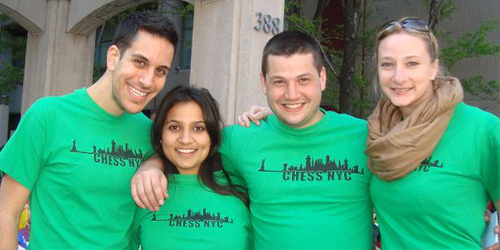Checkmate! Concordia grad's chess club helps New York youth
Chess anyone? For Russell Makofsky, co-president of the New York City chapter of the Concordia University Alumni Association, the strategic board game is a way of life.
As founder, director, president and CEO of Chess NYC, Makofsky's organization sees some 5,000 members weekly, including young students enrolled in more than 40 public and private schools throughout New York City's five boroughs.

“Chess is a language, culture and identity in itself,” says the newlywed Makofsky, BComm 2007, about the game his grandmother taught him when he was six years old.
“Chess is a great way to connect to people. For example, on my honeymoon in Capetown, South Africa, I was able to visit a local chess club. The chess was great, but more than that, there was a community environment within the chess subculture that made it easy for me to talk to people.”
Though the Long Island native points out he's not a professional player, Makofsky has made a life of the game. His Chess NYC has been acclaimed by international media including the BBC and Huffington Post.
For Makofsky, the most rewarding part of the gig is watching kids transform as a result of chess. “Chess teaches critical thinking, socialization, teamwork, commitment, logic,” he explains, referring to himself as a chess educator.
“We employ chess coaches who go into the schools and share our philosophy, unique curriculum and approach. We teach all different levels — from introductory programs to kids who compete internationally at the highest level.”
He feels chess is a magnetic game. “Once kids get that chess bug, it can really change their lives. We see it all the time; kids didn't have a passion or direction, they find chess and it becomes their universe and it transforms them. A lot of school districts and cities are taking steps to implement chess as an academic subject because they see its value as a social and learning tool. This is an opportunity for us, as an organization, to go in there and provide services they might not have internally.”
Chess NYC began as a passion project when Makofsky moved back to New York in 2007 upon graduating from Concordia. “The university gave me an amazing background and foundation,” says the graduate of the John Molson School of Business.

Concordia alumni volunteering at a Chess NYC event
It was a local bookseller on the Upper West Side that got him hooked on chess again. “I began to play with him every day, and we would chat. The chess board brought people together at that location, from students to elderly people — a really great cross-section of different people.”
Makofsky and a friend eventually decided to host a chess grassroots tournament. “We printed flyers, spread the word, and began to organize activities and engage the local community. As we gained a greater following, our reach began to grow as well.”
Success notwithstanding, Makofsky still loves watching new players become captivated by the game; and the positive growth that stems from their chess experiences — as both players and human beings.
“We've had kids with cases of Aspergers and other disabilities where they don't really feel accepted in social circles until they begin to play chess,” he says. “It's great seeing a big smile on these kids’ faces who are otherwise left without something to identify with.”
One of his young players recently competed in the World Youth Championship in Slovenia. “Seeing how passionate he was, how will and desire were able to move him along to a point where he's a premier player, was very rewarding,” Makofsky says.
“Our organization played a huge role in helping support, coach and mentor him, so seeing him succeed on a global level is extremely rewarding for us as well.”
Related links:
- Chess NYC
- John Molson School of Business - Concordia University
- Concordia New York Chapter
- “Alumnus builds popularity of chess in the Big Apple” — Advancement and Alumni Relations
- “One Day in New York City's Chess Scene” — BBC
- “Magnus Carlsen Storms New York's Chess Scene” — Huffington Post

